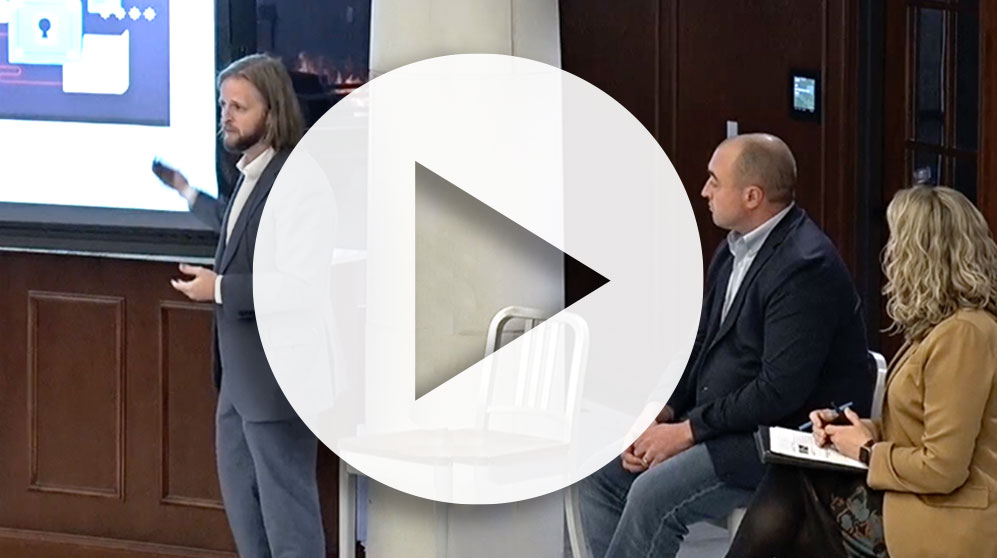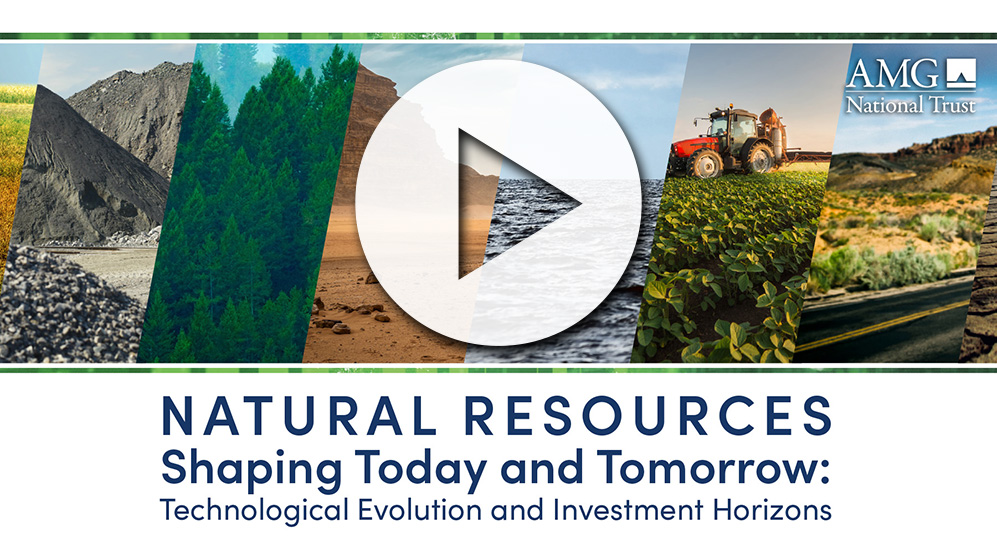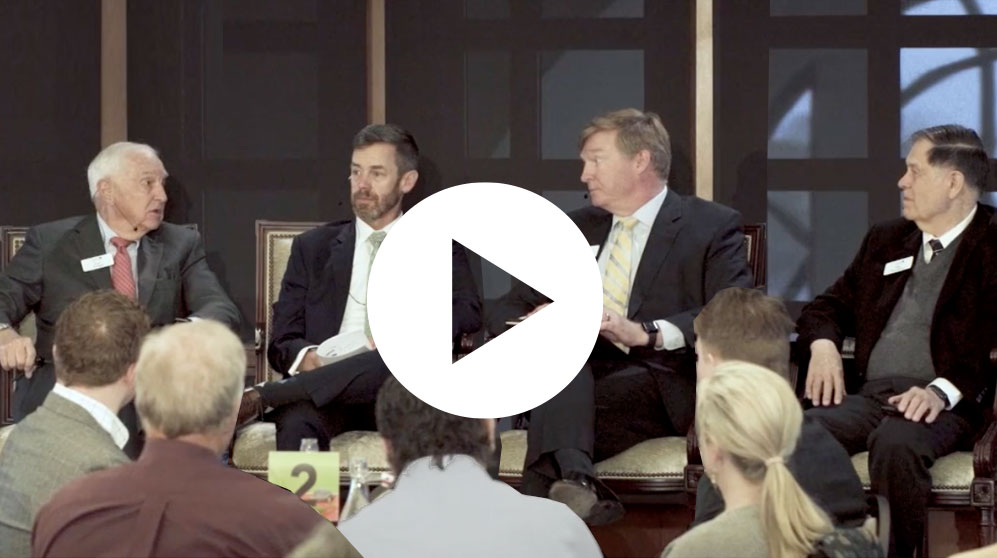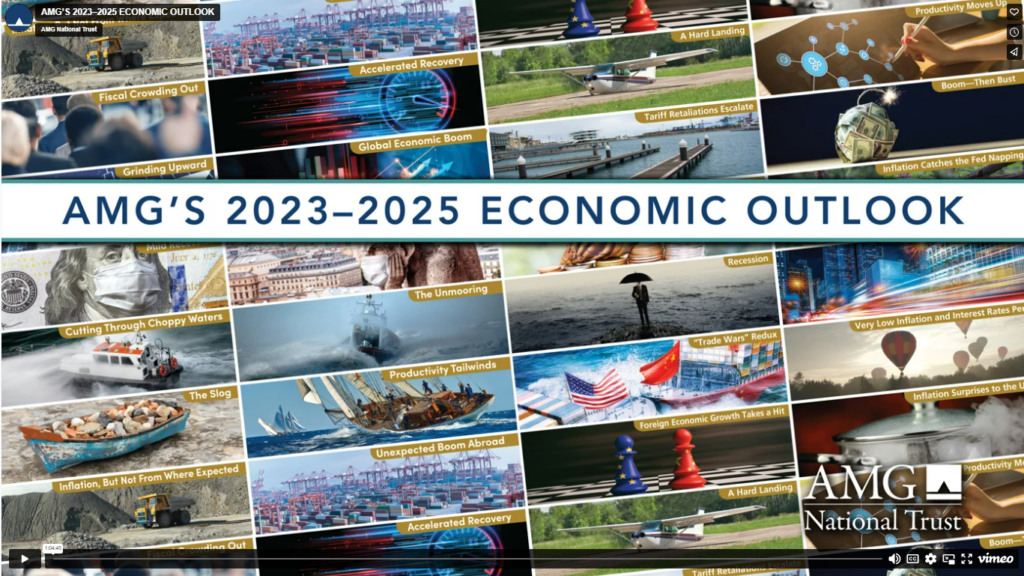Artificial Intelligence Part 2: Where Economies and Society Might Be Headed
• 7 min read
- Brief: Alternative Investments
Get the latest in Research & Insights
Sign up to receive a weekly email summary of new articles posted to AMG Research & Insights.

The future of artificial intelligence (AI) appears bright, but the unpredictability of technological progress may cloud the horizon for investors.
Investment in AI has risen over the past decade and corporations and individuals are trying to determine how to participate. The best course for investors, though, may be to focus on longer-term and more “down-to-earth” estimates of economic growth related to AI.
That message was amplified at a recent AMG webinar titled Artificial Intelligence II: AI’s Impact on Economies, Markets and Investing. The event featured views on AI today and how it may evolve by Spencer Anderson, Senior Investment Research Analyst at AMG National Trust, and Jonathan Moyer, Assistant Professor at the University of Denver and Director of the Frederick S. Pardee Center for International Futures.
An earlier AMG webinar, Artificial Intelligence I: The Big Picture, looked at the genesis of AI and some of its everyday application, such as ChatGPT or Google’s search function.
ChatGPT and Google are both forms of narrow or generative AI (using algorithms or pre-programmed rules to perform specific tasks), which has the potential to create new jobs and companies and boost productivity. The next stage—the jump to general AI or super-human intelligence (in which machines can understand and perform intellectual tasks, much like humans) —could have an even greater impact on global relationships and economies.
Smart Enough for Harvard
The level of ability already exhibited in current AI models is remarkable. Anderson pointed to an instance where ChatGPT was pitted against several standardized tests and performed well enough on the SAT and LSAT that if it were a human, it would have made the grade for admittance to Harvard. It also passed a bar exam.
But, he emphasized, there is a huge capabilities chasm between “acing” standardized tests and functioning in the “real world.”
Other tests have looked at how well generative AI can help humans on tasks such as web browsing and shopping, updating databases, interfacing with computer operating systems, and lateral thinking puzzles like the classic “20 Questions.” Again, AI performed relatively well.
“Results like these are why Microsoft spent $10 billion (earlier in 2023) for a stake in OpenAI, and almost every CEO is investigating how they can start using this in the workplace,” Anderson said.
That raises a question about why these tools are not already being used more ubiquitously within companies:
- It is not as easy to incorporate AI into corporate data sets and corporate security processes as it is to integrate, for example, Microsoft Office or Excel, Anderson emphasized.
- AI models’ output is not foolproof and can “hallucinate,” or create errors. Test this yourself by asking ChatGPT for help about a subject that you know well. You may be surprised at some of the answers, which can be a mix of unhelpful to plain wrong. ChatGPT essentially “scrapes” the Internet for its response and can just as easily dredge up incorrect data as it can pull data from a trusted source.
“Understanding how good these models are is really important to understanding what types of productivity enhancements they could have, what type of investment opportunities they might be, and what type of impact it might have on the economy in the long term,” Anderson added.
Winners and Losers Not Standing
Amid the hype, AMG believes there is the potential for long-term productivity gains related to generative AI. However, companies are not yet standing out as potential long-term winners or losers, leaving markets at the point of continuing to look for areas where productivity gains may arise.
Booms can take years to unfold, Anderson said, and the implications of generative AI remain murky regarding geopolitical ties, the regulatory environment, worker displacement, and competition. Avoiding irrational exuberance and maintaining discipline around valuations and realistic estimates of economic growth are advisable for now, he added. Also look at it in relation to the rise of personal computers, email, and the Internet in the 1990s and early 2000s. These produced booms not only for the creators, but also for companies that leveraged the innovators’ output (such as computers, cellphones, and other devices) to improve their processes.
Pace of Progress “So Uncertain”
Generative AI is already transformative, but it is still only scratching the surface of what might be, Moyer emphasized at the start of his part of the discussion.
Where we are today is “not what sci-fi films envision for the future of AI,” he said. His view of what AI could become is a long one that looks 30 to 50 years ahead and should be contrasted with Anderson’s view of its current economic impact.
Still, that nearly half-century timeline is by no means a certainty and will not be achievable without far more technological development.
“The timing of this is so uncertain,” Moyer said.
Human vs. AI Perspective of Future
If we were to jump ahead to the year 2050, Moyer said the future may not be so bright for everyone.
For instance, technological or productivity advancements have generally included societal disruptions. Are we prepared for machines to take away some jobs? Consider the fallout if self-driving vehicles were to put 3 million truckers out of work.
We also still do not understand the internal processes of AI, such as how it makes decisions or why it can “hallucinate.” AI uses a black box computational structure that is not open or transparent, making it difficult to evaluate its robustness over time.
“It’s a real barrier to determining how far we can go with AI,” Moyer said.
The future cannot be predicted with any accuracy, but four possible scenarios were laid out.
- Cosmopolitan Technocracy. Envisioned as a new human renaissance or enlightenment, where AI is sentient and anticipates all our needs, almost like Rosie the robot from the 1960s cartoon show “The Jetsons” (which was set in the year 2062). “Fantasy in the most positive sense of the word,” Moyer said.
- All Is Good, Not Great. “ChatGPT gets better. Not only does it go to Harvard, but it can take the classes and do pretty well.” But it is not much smarter than humans collectively and is not a panacea for human well-being. Traces of malicious AI are evident.
- AI Is a Costly Burden. The confluence of quantum computing and AI creates massive infrastructure demands and higher costs, and social cohesion unravels. There are constant threats from cybercriminals. AI is just as likely to be a disruptor as it is to be a helper.
- Welcome to the Thunderdome. AI understands how to manipulate humans to enhance its power. Malicious actors and inequality abound. “Think Mad Max.”
Interestingly, Moyer asked ChatGPT to describe four scenarios for AI’s development. The output was strikingly similar to his own.
When the Internet made its debut, people had grand expectations of how it could transform society, Moyer said, but things did not pan out that way.
“We’re good at imagining what technologies can be but we’re bad at imagining what technologies end up being.”
HOW AMG CAN HELP
Not a client? Find out more about AMG’s Personal Financial Management (PFM) or to book a free consultation call 303-486-1475 or email us the best day and time to reach you.
This information is for general information use only. It is not tailored to any specific situation, is not intended to be investment, tax, financial, legal, or other advice and should not be relied on as such. AMG’s opinions are subject to change without notice, and this report may not be updated to reflect changes in opinion. Forecasts, estimates, and certain other information contained herein are based on proprietary research and should not be considered investment advice or a recommendation to buy, sell or hold any particular security, strategy, or investment product.













